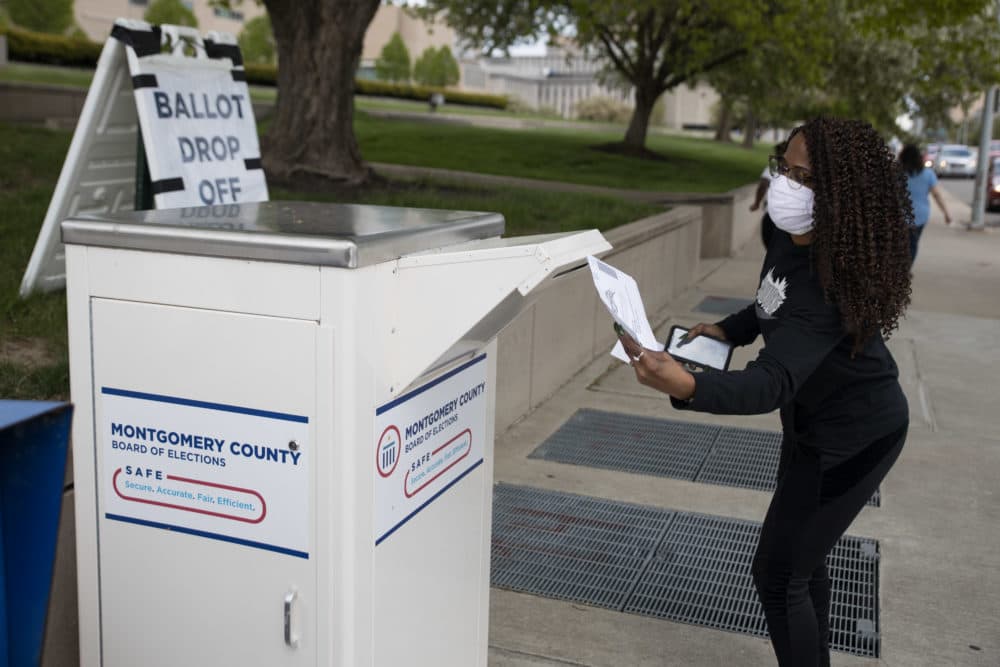Advertisement
On Point's Coronavirus Hours
How Do Elections Work In A Pandemic?

An election in a pandemic. What needs to be done now to ensure all Americans can safely vote in November and trust the results?
Guests
Rep. Adam Schiff, Democratic representative for California’s 28th District. Chairman of the House Intelligence Committee. (@RepAdamSchiff)
Anthony Brooks, On Point's 2020 correspondent. (@anthonygbrooks)
Bertrall Ross, chancellor’s professor of law at the University of California, Berkeley School of Law. (@Bertrall_Ross)
Interview Highlights with Rep. Adam Schiff
On access to the ballot and election interference
Rep. Adam Schiff: “I think the first issue among equals is access to the ballot by Americans in the midst of a pandemic. So concerns over people's health, whether we will make ready access to vote by mail. We're putting a significant amount of new funding in the new Heroes Act for that kind of vote-by-mail, vote at home effectively while you're sheltering in place. But, you know, second to that, I would say the Russians are not only likely to be back. Indeed, they've never left. They've continued interfering with us.
"And I think that if you look back at 2016, one of the things that they did quite successfully was seek to manipulate these great divides in American society, divides over ethnicity, over immigration status, over abortion, any number of really hot button issues. Well, the great divide in the fall is going to be over the pandemic. That will be the number one, two and three issues in the election campaign. So we can fully anticipate that the Russians are going to seek to exploit those divisions, egg on protests like we see already. And that's my primary concern in terms of foreign intervention.”
On evidence of Russian interference online
Rep. Adam Schiff: “There’s certainly evidence that the Russians are continuing to interfere on social media. And I'm obviously cabined in what I can tell you in terms of intelligence sources, but I can certainly share that the private companies that watch their platforms have already identified and taken down inauthentic accounts they've seen. I think the Russians are trying perhaps more successfully to hide their hand and not be quite so obvious in terms of having a troll farm operating from St. Petersburg. But trying to outsource some of their social media interference in our election.
"So they've never stopped. You know, what we've seen is an intensification around elections of these activities. In the midterm elections, for example, the Russians engaged in spear-phishing attacks like they had two years earlier. We didn't see the broad hacking and dumping operations. So, you know, that's one question we have going into the fall is ... will they be as brazen as they were in 2016 or do they feel now that the repercussions are too great if they show their hand too visibly? But I am deeply concerned that the president's actions have only encouraged a further Russian interference, not discouraged.”
“There’s certainly evidence that the Russians are continuing to interfere on social media."
Rep. Adam Schiff
Has the pandemic made the ground more fertile for Russian intervention in elections?
Rep. Adam Schiff: “It does, I think, make things worse because there is this great new divide for the Russians to stoke American divisions and animosities. You know, the Russians right now are watching these protests going on in state capitals where you have heavily armed people going to call for the reopening of government before health experts are saying it's safe to reopen the government. This gives the Russians a great opportunity to do the same kind of false flag operations where they were actually able to stimulate and spark protests in the United States from their cubicles in St. Petersburg.
"But it also, I think, helps to undermine American confidence in our own democratic form of governance. To exacerbate these divisions, these protests, these angers that Americans have towards their own government or towards each other. You know, the goal in 2016 for the Russians was, yes, to help the preferred candidate, Donald Trump, and to hurt Hillary Clinton. But their goal also was to weaken American society, cause Americans to question their own society. This allows Putin to trumpet the advantages of his autocratic model.
"China right now is much the same, making use of this response. This, you know, I think very unsuccessful indeed, incompetent response by the administration to the pandemic, the level of infection in the United States, the level of death in the United States. China is using it to propagandize and say, 'Look, our autocratic model is superior. We're sending protective gear to the United States, not the other way around.' So, you know, we can expect, I think, any adversary or competitor to use this issue to their advantage and they already are.”
Advertisement
"We can expect, I think, any adversary or competitor to use this issue to their advantage and they already are.”
Rep. Adam Schiff
Is ordering ballots to be mailed to voters — as California governor Gavin Newsom is doing — possibly a good route for the rest of the country to go?
Rep. Adam Schiff: “I think it really is for several reasons. The most important being that it will avoid the conflict that we saw in Wisconsin where people had to choose their health or their vote. You know, the fact that people were lined up in lines, that poll workers were exposed to getting sick, that many people did get sick as a result of exercising their franchise is just an abomination that we can't allow, you know, that kind of draconian choice to confront voters in the fall.
"So the safest way when you're sheltering-in-place — and many states may still have some form of that in the fall when the virus comes back or if it resurges — the safest way to shelter-in-place and vote is to vote in place. Vote in your home through a vote-by-mail. We put $3.6 billion in this latest legislation unveiled yesterday to help the states afford to set up vote-by-mail. And it can be done safely. It could be done securely."
"That many people did get sick as a result of exercising their franchise is just an abomination that we can't allow."
Rep. Adam Schiff
New York Times: "Will Americans Lose Their Right to Vote in the Pandemic?" — "In March, as a wave of states began delaying their spring primaries because of the coronavirus, Wisconsin’s election, scheduled for April 7, loomed. The ballot for that day included the presidential primary, thousands of local offices and four statewide judgeships, including a key seat on the Wisconsin Supreme Court. On March 17, the day after Ohio postponed its spring election, voting rights groups asked Wisconsin’s Democratic governor, Tony Evers, to do the same."
UC Irvine School of Law: "Fair Elections During a Crisis" — "Even before the worldwide COVID-19 pandemic arrived in the United States, close observers of American democracy worried about the public’s faith and confidence in the results of the upcoming November 2020 U.S. elections. Although a decade ago concerns about peaceful transitions of power were less common, Americans can no longer take for granted that election losers will concede a closelyfought election after election authorities (or courts) have declared a winner."
Brennan Center: "Estimated Costs of Covid-19 Election Resiliency Measures" — "On March 19, the Brennan Center published a preliminary estimate of the cost of adapting the country’s voting systems and practices to ensure that the coronavirus pandemic wouldn’t interfere with safe and secure election in November. Our estimate: approximately $2 billion. Importantly, this estimate did not include the cost of ensuring the safety and security of the many other statewide and local elections that will occur throughout 2020."
Los Angeles Times: "California voters asked to vote by mail in November due to coronavirus fears" — "Citing public health concerns over millions of Californians showing up at voting locations this fall, Gov. Gavin Newsom on Friday ordered ballots to be mailed to the state’s 20.6 million voters for the November election while insisting there will need to also be new rules for anyone who participates in person."
New York Magazine: "Relatively Non-Disastrous Ohio Primary Could Be Harbinger for November" — "After the dark, Kafkaesque April 7 primary in Wisconsin, characterized by Republican and judicial insistence on in-person election-day voting, the April 28 Ohio primary seemed relatively benign and successful. Unlike Wisconsin governor Tony Evers, Ohio’s Mike DeWine managed to postpone the original primary (scheduled for March 17) and make it a mostly vote-by-mail event."
Foreign Policy: "Here We Go Again: Russia Gears Up to Interfere in 2020 Election With Coronavirus Disinformation" — "The public debate over COVID-19 has been dominated, understandably, by the pandemic’s impact on public health and the economy. However, there is a third impact that is dramatically underappreciated: the danger to democracy posed by pandemic-related disinformation, whether it is used to weaken democratic checks on power or interfere with elections."
UC Berkeley's The Daily Californian: "COVID-19 presents threats to democratic process in general election" — "Five campus experts from varied disciplines talked about the challenges the coronavirus pandemic will present for the 2020 general election in the latest installment of the campus’s virtual conversation series Friday."
WBUR: "Amid The Pandemic, Lawmakers Push Vote-By-Mail Law In Massachusetts" — "Members of Massachusetts' Congressional delegation are calling on Beacon Hill lawmakers to pass a statewide vote-by-mail law, while urging Congress to fund efforts to expand voter access. The push follows the recent primary in Wisconsin — where tens of thousands of people were forced to choose between their right to vote and risking their health."
This program aired on May 13, 2020.

